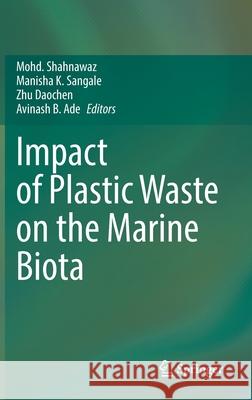Impact of Plastic Waste on the Marine Biota » książka



Impact of Plastic Waste on the Marine Biota
ISBN-13: 9789811654022 / Angielski / Twarda / 2022
Impact of Plastic Waste on the Marine Biota
ISBN-13: 9789811654022 / Angielski / Twarda / 2022
(netto: 613,40 VAT: 5%)
Najniższa cena z 30 dni: 616,85
ok. 16-18 dni roboczych.
Darmowa dostawa!
Chapter 1. Degradation of plastic waste in the marine environment.- Chapter 2. Generation and management of macro–plastic waste.- Chapter 3. Generation and management of microplastic waste.- Chapter 4. Biodegradation of the Macro-plastic Waste using Microbial approach.- Chapter 5. Strategies to cope with the plastic pollution in the sea.- Chapter 6. Mitigation of the plastic pollution in the marine environment to conserve the marine biota: An overview.- Chapter 7. Regulations To Minimize The Entry Of Plastic Waste Into The Oceans.- Chapter 8. Recent trends to address plastic waste at the global level.- Chapter 9. Mitigation of the micro and nano-plastic using phycoremediation technology.- Chapter 10. Impact of the COVID-19 Outbreak on The Generation of Plastic Waste.- Chapter 11. Entry of macro, micro, and nano-plastic in the food chain and their impact on marine life (from source to sink).- Chapter 12. Effect of meso, micro, and nano-plastic waste on the benthos.- Chapter 13. Impact of Plastic Waste on the Coral Reefs: An Overview.- Chapter 14. Ecotoxicological impact of macroplastic to nanoplastic on marine macrophytes.- Chapter 15. Ecotoxic effects of the plastic waste on marine fauna: An overview.- Chapter 16. Plastic waste enhancing the pathogenicity of the pathogens to cause diseases in the marine biota.-
Recently, Dr. Mohd. Shahnawaz got selected as an Associate Professor at Biofuel Institute, School of the Environment and Safety Engineering, Jiangsu University, Zhenjiang, China. Last year, he got selected as a postdoc fellow at Yeungnam University, South Korea; however, due to the COVID-19 scenario, he was not able to join. He has several years of teaching and postdoctoral research experience. Dr. Shahnawaz worked on bioremediation of polythene at the Botany Department, SP Pune University, during his doctoral research with Prof. A. B. Ade. He is recipient of various fellowships awarded by the SPPU, UGC-BSR, UGC-MANF, and DST-SERB. His research interest is in Ecology, Microbiology, Bioremediation, and Plant Biotechnology. Currently, he is focused on the mitigation of microplastic using bioremediation technology. He has served as a reviewer and editor for several international journals and had received the Young Scientist Award (2019) from VDGood Professional Association at Vishakhapatnam, India. He has published more than 20 research articles in peer-reviewed journals and authored/edited 8 books of international repute.
Dr. Manisha K. Sangale is currently working as a Scientist at Cyfoeth Naturiol Cymru, Natural Resource Wales, Swansea, United Kingdom. Previously, she worked as an Assistant Professor (Botany) at Radhabai Kale Mahila Mahavidyalaya, Ahmednagar. She had also worked as an Assistant Professor (Botany) at SM Joshi College, Pune, and Yashvantarao Chavan Institute of Science, Satara. She worked on bioremediation of polythene with Prof. A. B. Ade in the Botany Department at Savitribai Phule Pune University. She received UGC-BSR fellowship during her doctoral degree. Her research interest is in Phycology, Mycology, Ecology, Microbiology, and Bioremediation. She has served as referee for a number of international journals. She has published more than 17 research articles in peer-reviewed international journals and authored/co-authored 2 book of international repute. Recently, she received the Young Scientist Award by VDGood Professional Associations.
Dr. Avinash B. Ade is currently working as a Professor and Head of the Department of Botany, Savitribai Phule Pune University, India. He has earlier served as an Associate Professor (2005–2009) and Assistant Professor (1997–005) in the Department of Botany, Dr. Babasaheb Ambedkar Marathwada University, India. His research interest is in Ecology and Cytogenetics with specialization in Plant-Microbes Interaction and Bioremediation. He has been conferred with various prestigious awards, notably, Dr. M. A. Dhore Gold Medal for standing first in the order of merit in M.Sc. (Botany) examination conducted by Amravati University, Amravati (1996). He has served as referee for a number of national and international journals. Dr. Ade has more than 21 years of teaching experience in plant ecology, cytogenetic, genetics, plant pathology, and bioremediation. He has also published more than 65 research articles in peer-reviewed international journals and authored/edited more than 10 books and numerous book chapters. He is a member of many international scientific societies and organizations.
This contributed volume focuses on the effects of macro, meso, micro, and nanoplastic waste on marine biota. It discusses the threats posed by plastic waste on the flora and fauna in the marine environment. This book will help in understanding different aspects of plastic waste generation, its transportation with different natural and anthropogenic ways, its accumulation at the seacoast, and its impact on marine biota. The book also suggests strategies for saving marine life from threats posed by plastic waste and presents methods to reduce its generation using different strategies. This book is of interest to teachers, researchers, climate change scientists, capacity builders, and policymakers. It also serves as additional reading material for undergraduate and postgraduate students of Ecology, Botany, and Environmental Sciences.
1997-2026 DolnySlask.com Agencja Internetowa
KrainaKsiazek.PL - Księgarnia Internetowa









